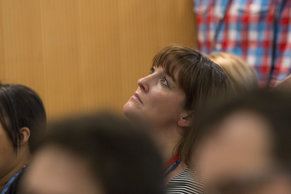Defensive Perfectionism
Modes of thinking are often portrayed as inescapable elements of personality whereas in the real world people use different modes of thinking strategically. Perfectionism can be used in a defensive way to prepare for criticism or improve results. For example, a designer who asks themselves how would a perfectionist criticize this design before presenting it to a client.Self-Criticism
Self-criticism is the ability to self-identify problems with your thinking or behavior. This is a basic thinking process that is important to self-control and self-improvement. However, this is often portrayed in a negative light alongside perfectionism as unnecessarily causing unhappiness. This assumes that the process of identifying faults and gaps between realities and perfect possibilities makes people unhappy. It is possible to identify your imperfections and remain happy as this allows you to seek improvement.Work Ethic
Perfectionism may create a high work ethic as it is time consuming and engaging. A high work ethic is often cast in a negative light using terms such as workaholic based on the assumption that this is stressful and decreases quality of life. However, where people find self-fulfillment in their profession this isn't always true.Attention to Detail
Attention to detail is the ability to do detailed tasks properly with no mistakes. This is critical to some professions, activities and tasks and is considered a valuable talent. For example, attention to detail is useful to accounting and auditing of financial records.Diligence
Diligence is care and persistence in work. On a scale of diligence from low to high, perfectionism is high. This could be useful to some pursuits and harmful to others. Spending an hour wrapping a Christmas present for a customer at department store is only likely to annoy the customer, even if the bow is perfect. Getting a mathematical calculation right that is used to judge the maximum wind resistance of a bridge requires high diligence.Convergent Thinking
Convergent thinking is the process of solving a problem that has a known correct solution. Perfectionism is useful to convergent thinking as it simply means you keep working until you're sure you have the correct answer.Divergent Thinking
Divergent thinking is the process of solving a problem that has no correct or perfect solution. Perfectionism could be dangerous here if you took it too far. For example, spending 20 hours looking for the perfect birthday present for someone and still feeling dissatisfied about it.Micromanagement
Micromanagement is the diligent control of the work of a team. This term has decidedly negative connotations. However, in the real world this approach is required in some roles or in dealing with contributors who are failing to produce satisfactory work.Pareto Principle
According to a theory known as the pareto principle, 80% of a result is created with the first 20% of work. This would indicate that perfectionism is unproductive for areas where this theory holds true. Some activities demand that you continue past the 80% of your result that are the easiest. For example, nobody wants to fly on an aircraft that's 80% safe.Fail Fast
Perfectionism isn't useful to innovation whereby you're trying to validate brave ideas that are likely to fail. Innovation uses techniques such as fail fast, fail well, last responsible moment and minimum viable product that are all ways to avoid perfectionism in order to experiment aggressively.Failure Is Not An Option
Failure is not an option is a destructive pursuit of a goal that is clearly not possible. In some cases, perfectionists may pursue goals in an unhappy and unrealistic way. However, recognizing and learning from failure is a basic process of thinking that isn't necessarily inconsistent with perfectionism.Performance
The process of using knowledge of results and knowledge of performance to improve. For example, a competitive athlete who seeks to perfect elements of their performance.
Refinement
Refinement is the pursuit of perfection in an art with the recognition that perfection can't actually be reached. For example, a world renown violinist who mastered the violin and works to refine their art.Perfect Imperfection
Perfect imperfection is the idea that perceived imperfections are in fact perfect. Paradoxically, perfectionism can take the form of a pursuit of imperfection. Japanese arts are well known for this approach whereby refinement seeks elegant imperfection, an aesthetic known as wabi-sabi. For example, Japanese tea ceremony is the pursuit of perfection in the humble act of serving and consuming tea. Here perfection, isn't robotic and systematic but human, rustic and rhythmic. The point isn't to achieve perfection but rather to enjoy the journey of seeking it.
Raising the Bar
Raising the bar is the process of pushing work quality to new levels. For example, American business magnate Steve Jobs was considered an aesthetic perfectionist who arguably raised the bar on the expected quality and usability of consumer devices.Notes
The article above covers what's known as "normal perfectionism" as a strategy or character trait. We define this as "high diligence towards a particular task or pursuit."| Overview: Perfectionism | ||
Type | ||
Definition | The pursuit of the highest standards and best possible results. | |
Definition (2) | The application of high diligence towards a particular task or pursuit. | |
Definition (3) | An inability to stop short of perfection. | |
Related Concepts | ||




































